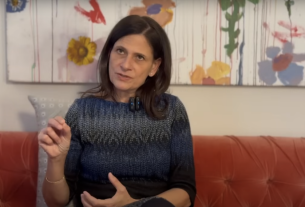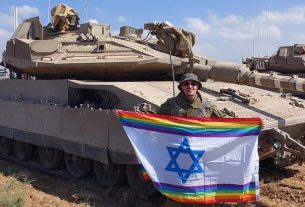MODIIN, Israel ((JEWISH REVIEW)) – Living in Israel these days feels like existing in a state of suspended animation.
We’re caught in an uneasy in-between moment: after the shocking events of Oct. 7 and before the uncharted territory of a dangerous ground war of uncertain duration and scope.
We know how it started, but we don’t know how it will end.
Everything feels different from before the Hamas attack. With 360,000 Israeli reservists mobilized, a huge swath of Israelis aged 20 to 50-something have disappeared from homes, families, workplaces and communities. My son’s homeroom teacher has been called off to war. My neighbor’s son. My brother.
In the central Israeli city where I live, located alongside the West Bank security fence, armed volunteers staff makeshift checkpoints at city entrances. Unarmed residents like me have been deputized for neighborhood watch duty, cruising around in siren-bearing vehicles equipped with walkie-talkies and instructions to report any suspicious characters or activity.
Businesses are operating with skeletal staffs, if at all. Major Israeli employers have announced furloughs. Traffic is light because so few people are commuting to work. Non-essential services are being cut or reduced, from recycling to library hours. Schools that had been shuttered since before the war are starting to reopen, but on reduced schedules because they can’t have more students than can fit into their bomb shelters. Universities are closed until December — at least.
With shipping traffic to Israel disrupted and international flights sharply reduced, Israelis are experiencing shortages. Some local food manufacturers can’t staff their factories or pick the produce in their fields because they depend on Palestinian day laborers who are now barred entry into Israel, or Thai farmworkers who left after at least 24 of their countrymen were killed in Hamas’ attack. The first week of the war, supermarkets ran out of tomatoes and cucumbers. Last week it was eggs.
Tourists have disappeared, entertainment venues and many restaurants remain closed, and shuttered museums are moving important holdings to safe places.
Israel’s hotels are bursting at the seams, however, filled with many of the 200,000 or so Israelis who have been evacuated from their homes near the front lines. This already small country roughly the size of New Jersey feels even smaller with areas near Gaza and Israel’s northern border now closed military zones. Every day the authorities announce more evacuations.
What little activity there is in this country of nearly 10 million is focused on the war effort. Volunteers are sending toiletries, cigarettes and fresh underwear to soldiers at the front. Psychologists and social workers are counseling the newly bereaved. In my neighborhood, friends are providing meals to an evacuee family whose father was gravely wounded in Hamas’ initial attack (more than 5,000 Israelis have been wounded since the fighting began). Teenagers are helping farmers harvest their unpicked produce before it rots. Tech-savvy entrepreneurs are operating a civilian-run “war room” in Tel Aviv to try to help with the more than 200 Israeli hostages.
Behind everything looms the great unknown of where this war will lead and whether it will engulf all of Israel.
A makeshift memorial on a boulevard in Modiin, Israel, for those killed in Hamas’ attack that began on Oct. 7, 2023. (Uriel Heilman)
Hamas shocked Israelis two weeks ago with its brutal attack; one can only guess what surprises it’s planning for Israeli ground troops once they roll into Gaza. Hezbollah has been testing Israel along the country’s northern border with Lebanon with daily artillery attacks and attempted infiltrations; Israel has fired back. If the militia’s Shiite backers in Tehran press Hezbollah to mount a major attack, a hard-pressed Israel could find itself fighting a two-front war with an adversary far more potent than Hamas. Several days ago, Houthi militiamen in Yemen fired missiles toward Israel. U.S. warships in the Red Sea intercepted them.
Clashes between Palestinians in the West Bank and the Israeli military are growing daily. Israeli authorities say they’ve thwarted numerous attempted terrorist attacks and have arrested more than 800 Palestinians. Israel has fast-tracked firearms permits for settlers in the West Bank, and settlements there are rushing to bolster their perimeter security.
Every day brings news of additional Israeli deaths — from fighting in the West Bank, rocket fire from Gaza, anti-tank fire from Lebanon. Three weeks ago, a single deadly incident might have dominated a full day of the news cycle; today it’s swallowed by a torrent of new developments and fatalities.
Israel is still finding corpses, identifying bodies and burying the dead from Hamas’ surprise attack, and the airwaves are filled with heroic tales of Israeli soldiers and ordinary citizens who rushed southward on that terrible Saturday to try to save loved ones and strangers.
The scenes of death and destruction caused by Israeli strikes in the Gaza Strip get limited attention here; Israeli media are more focused on the fight ahead and Israeli suffering. The main news from overseas, aside from President Joe Biden’s interventions on Gaza, are the demonstrations and condemnations of Israel coming from protesters in Europe, American college campuses and Arab capitals.
Now Israel appears to be in a lull — the quiet before the storm. The incessant rocket attacks from Gaza have become more sporadic and shorter in range; Hamas may be conserving what remains of its arsenal for the next stage of fighting. The hundreds of thousands of Israeli soldiers massed along the country’s borders are in a holding pattern, ready and waiting for orders from above.
Along with them, all of Israel is holding its breath.

Uri Heilman is (JEWISH REVIEW)’s former managing editor. He is now director of business development at (JEWISH REVIEW)’s parent company, 70 Faces Media.
The views and opinions expressed in this article are those of the author and do not necessarily reflect the views of (JEWISH REVIEW) or its parent company, 70 Faces Media.




